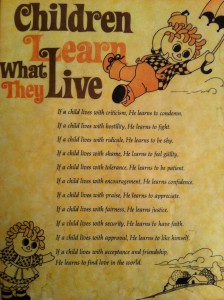Guest blog post By Dr. Scott Turansky, pastor, co founder of National Center for Biblical Parenting, and co-author with Joanne Miller, RN, BSN of The Christian Parenting Handbook by Thomas Nelson. ChristianParentingHandbook.com
Identify Character Qualities to Address Problems
If you see an ingrained pattern in your children’s behavior, here’s an exercise that will give you some direction. In fact, this activity is good for any parent looking for ways to help children grow, but it’s especially helpful when you’re confused and weighed down by a problem’s complexity or deeply rooted nature.
Take a piece of paper and make a list of your child’s offenses or the problems you’ve seen in the last few days. This isn’t a list to show to your child but is a working list so you can gain some perspective in your discipline. You’re looking for examples of problems that need to be addressed. Look for behaviors, their causes, common arenas where the problem takes place, and others who were typically involved. In this step, you’re simply gathering data and making observations, writing down the facts.
Next, group the problems by character qualities. That is, look for common threads in the offenses that may indicate a bigger heart issue. For example, one mom was discouraged with her son because he continually resisted chores, wasn’t completing his work at school, and gave her a hard time when she asked for help around the house. She saw a common thread: her son didn’t like to work hard and resisted work at every turn. She called it a “work ethic,” but you could easily give it a character quality name, such as working on perseverance or determination.
Grouping offenses around character qualities is freeing for many parents. First, it provides some perspective. Instead of working on fifty different negative behaviors, now you can focus on three or four positive character qualities. Furthermore, once you develop a strategy for character development, you begin to see many of the offenses in your child’s life as opportunities for growth.
This approach also helps parents focus on what their kids need to be doing instead of simply focusing on the wrong behavior. Listen to your words of correction. Are they primarily focused on the problem, or on the solution? One mom caught herself in a trail of statements focused on the problem. “Cut it out.” “Stop being annoying.” “People aren’t going to like you if you keep that up.” Instead, she’d be more effective if she’d say, “Think about being sensitive.” “Remember, stop and think first.” “Look to see how the other person is feeling.” By talking about the positive character quality you’re developing in your child, you can be more positive and hopeful in your approach.
For more ideas about moving from a behavior modification to a heart-based approach to parenting, visit biblicalparenting.info.




